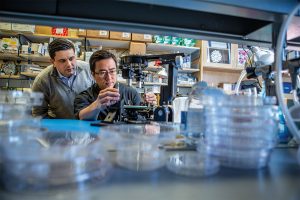
Throughout the 60-year history of the U.S. space program—from the Mercury capsules of the 1960s to today’s International Space Station—astronauts have been getting sick. Researchers know being in orbit seems to suppress their immune systems, creating a more fertile ground for infections to grow. But nobody really understands why.
Early on the morning of April 26, a SpaceX Falcon 9 rocket will launch a cargo mission to the ISS from Cape Canaveral Air Force Station. Along with fresh water, food, and other necessities for the crew, the craft will be carrying two experiments designed by Penn scientists that could help shed light on why bugs have bedeviled space travelers.
For more than a decade, Dan Huh, the Wilf Family Term Assistant Professor of Bioengineering in the School of Engineering and Applied Science, has been developing super-small devices that use living cells to stand in for larger organs. These organs-on-a-chip hold great promise for all kinds of research, from diagnosing disease to curing them. They’re also a way to test things, including drugs and cosmetics, in a way that mimics real life without relying on animal subjects.
Read the full story at Penn Today. Media contact Gwyneth K. Shaw.
